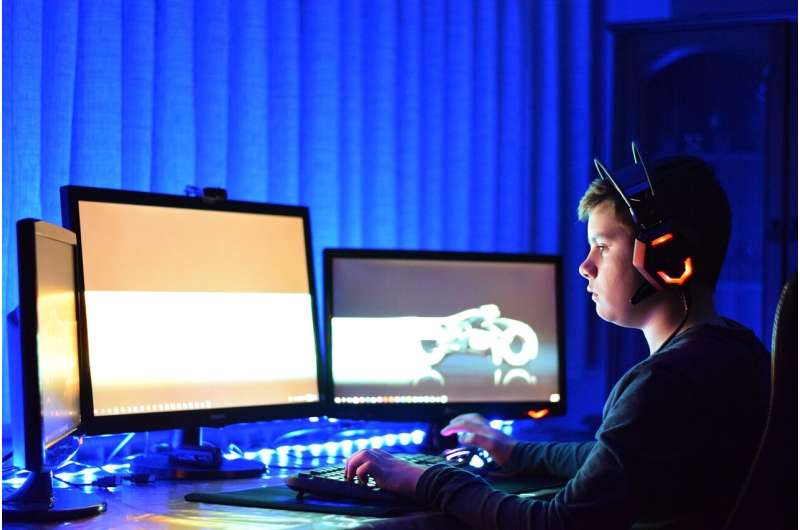This article has been reviewed according to Science X's editorial process and policies. Editors have highlighted the following attributes while ensuring the content's credibility:
fact-checked
trusted source
proofread
New poll finds 50% of parents believe too much time on technology keeps kids from forming connections in the classroom

Building positive connections with teachers and peers in the classroom can be critical to the mental health and academic success of children and adolescents. Yet a new national poll from The Kids Mental Health Foundation, conducted by Ipsos, finds half of parents believe that spending too much time on technology and social media keeps children from making meaningful connections as they head into the upcoming school year.
The poll highlights top reported challenges for kids in forming classroom connections. According to more than 1,000 parents surveyed across the United States, the top challenges are:
- Too much time with technology (50%)
- Bullying (30%)
- Social impact of the pandemic (22%)
Differences in culture and background can also be a factor, with about one in five parents (19%) reporting that children struggle to make connections at school because they don't feel like they fit in because of their race, ethnicity, culture, socioeconomic status, or gender identity.
"We know connections help foster a sense of belonging and when kids feel like they belong at school, they perform better academically and live healthier lives overall. Belonging is especially important to the adjustment and acculturation of immigrant children," said Ariana Hoet, Ph.D., executive clinical director of The Kids Mental Health Foundation and a pediatric psychologist at Nationwide Children's Hospital. "Technology is not all good or all bad, but parents should look for warning signs if you feel your child's balance with technology use is affecting their real-world social connections."
Warning signs parents should watch for to help determine whether their child is spending too much time on social media, gaming or other screens include:
- Losing track of time. Check to see whether your child is being honest about the amount of time they are spending on devices.
- Being preoccupied/distracted. Observe whether your child urgently feels a need to return to their device(s) or screens during offline activities.
- Isolating. Look for a lack of interest in "real life" social connections and activities.
- Irritability. Watch for signs of anger or irritability while playing (which could include throwing a controller, yelling or breaking things).
- Physical health effects. Keep an eye out for drops in sleep or physical activity, changes in eating patterns or an increased focus on appearance.
- Changes in offline activities. Watch for negative changes to interactions or relationships with family or friends, and decreased school performance.
The survey also finds that connection-based concerns for kids include fitting in (14%), making new friends in class (17%), being bullied or excluded (13%), and making new friends in sports and extracurricular activities (5%).
"The good news is that teachers and parents can help increase feelings of belonging in children," said Dr. Hoet. "However, we have to keep in mind that this may be harder for immigrant parents who may not understand the school system and culture."
To help children of marginalized or underrepresented groups experience greater feelings of belonging, parents, caregivers and others can:
- Find mentors to model positive behavior. Your child may benefit from connecting with family, friends, relatives or even kids a few years older. Hearing that others who look like your child have successfully navigated high school or college may give them the confidence to increase their sense of belonging.
- Seek out settings where your child fits in. Underrepresented kids may not feel connected at school, but they might enjoy clubs or cultural organizations where they have something in common with others in the room. The more places your child experiences social connectedness, the better.
- Check in with your child. Find out how they're feeling at school or in other social venues. Make sure they aren't experiencing online bullying or receiving negative feedback on social media, because hurtful online experiences can harm a child's real-world perception of belonging. Take time to help kids who feel like they don't fit in.
The Kids Mental Health Foundation, founded by Nationwide Children's, provides expert-backed content for parents, caregivers and teachers. Resources like Signs Your Child is Stuck on Screens, Talking to Kids about Social Media, Why School Belonging Matters, Boosting School Connections and 10 Ways to Combat Bullying can help teachers and caregivers increase the protective factors around children, like school belonging and adult-child connections, and boost the mental health of young students.
This Kids Mental Health Foundation/Ipsos poll was conducted August 2-4, 2024, by Ipsos using the probability-based KnowledgePanel. This poll is based on a nationally representative probability sample of 1,146 adult parents of children under the age of 18. The survey has a margin of error of ± 3.1 percentage points at the 95% confidence interval for all respondents.
More information: For more resources, please visit KidsMentalHealthFoundation.org.
Provided by Nationwide Children's Hospital





















